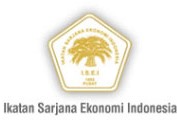Strategy of Strengthening Social Capital of Farmer Group in Agricultural Development
(1) Alumni of FEB, Diponegoro University,
(2) Lecturer of FEB, Diponegoro University,
Abstract
In the village, the agricultural development is not certainly oriented to the economic aspect. The social intervention is very important and very helpful for the citizens and the development of the agricultural itself. The purpose of this research is to analyze the social existence, the social influence, and also the systematic strategy that can strengthen the society in developing the agriculture. The method used in this research is the qualitative analysis with phenomenology approach. The qualitative analysis is conducted by the direct observation in the field and in-depth interviews with the respondents that are selected by the purposive sampling. The result shows that a society has formed the farmer organization to have mutual coordination among the members. However, there are some problems that occur on this organization. The values and norms begin to fade and have become the major problem. Another problem is the sense of trust among the citizens and the unoptimal social network utilization. The conclusion is, the Analytic Network Process (ANP) shows that to make a progress of agricultural development, they need to strengthen the social relationship among the citizens to face all the problems that may occur.
Keywords
Full Text:
PDFReferences
Ascarya. 2010. Determinan dan Presistensi Margin Perbankan Konvensional dan Syariah di Indo-nesia. working paper series No.WP/10/04. Pusat Pendidikan dan Studi Kebanksentralan Bank Indonesia.
Badan Pusat Statistik. 2011-2013. Statistik Indonesia. Jakarta.
________. 2013. Sensus Pertanian 2013. Jakarta.
Bourdieu, P. 1986. ‘The Forms of Capital’, in Richardson, J. (ed) Handbook of Theory and Research for the Sociology of Education. New York: Greenwood Press. Hal 242
_______. 1988. Homo Academicus (P. Collier, Trans.). Stanford: Stanford University Press
Bulu, Yohanes G., Sunaru S. Hariadi, Ageng S. Herianto dan Mudiyono. 2009. Pengaruh Modal Sosial dan Keterdedahan Informasi Inovasi Terhadap Tingkat Adopsi Inovasi Jagung di Kabupaten Lombok Timur Nusa Tenggara Barat. Jurnal Agro Ekonomi, Vol 27 No.1, Mei 2009 :1-21
Burt, Ronald S. (1992). Structural Holes. Cambridge Mass: Harvard University Press.
Cahyono, Budi dan Ardian Adhiatma. 2012. “Peran Modal Sosial dalam Peningkatan Kesejahteraan Masyarakat Petani Tembakau di Kabupaten Wonosobo”, Proceedings of Conference In Business, Accounting and Management, UNISSULA, Semarang, pp.131-144
Coleman, JS. 1990. Foundation of Social Theory. Harvard University Press, Cambriedge and London.
Dinas Pertanian dan Perkebunan Kabupaten Semarang, (2014), Rekapitulasi Luas Lahan dan Hasil Pertanian 2010-2014, Ungaran.
Fukuyama, Francis. 1995. Trust : The Social Virtues and the Creation of Prosperity. NY: Free Press.
Inayah. 2012. Peranan Modal Sosial dalam Pemba-ngunan. Ragam Jurnal Pengembangan Huma-niora, Vol. 12, (No 1). (diakses dari http://www. polines.ac.id/ragam/index_files/jurnalragam)
Lawang, R.M.Z. 2005. Kapital Sosial dalam Perspektif Sosiologik. Cetakan Kedua. FISIP UI Press. Depok.
Lyon, Ferguson. 2000. “Trust, Network dan Norms: The Creation of Social Capital in Agricultural Economies in Ghana”, World Development Journal, Vol. 28, No. 4, pp. 663=681
Pranadji, Tri. 2006. Penguatan Modal Sosial Untuk Pemberdayaan Masyarakat Pedesaan dalam Pengelolaan Agroekosistem Lahan Kering. Jurnal Agro Ekonomi, Vol. 24 No.2, Oktober 2006 :178-206.
Pramono, St. Agung Dwi. Pengaruh Modal Sosial Terhadap Kemiskinan Rumah Tangga. JEJAK Journal of Economics and Policy. Vol 5 No (2) (2012): 117-229
Putnam, Robert. “Tuning In, Tuning Out : The Strange Disappearance of Social Capital in America”. Political Studies Vol. 4 No. 28 (1995).
Rokhani. 2012. Penguatan Modal Sosial dalam Penanganan Produk Olahan Kopi pada Komunitas Petani Kopi di Kabupaten Jember. J-SEP, Vol. 6 No.1, Maret 2012
Rothstein, B. and Uslaner, E.M. 2005. All for All: Equality and Social Trust LSE Health and Social Care. Discussion Paper Number 15. London: LSE Health and Social Care. Available at: http:// www.lse.ac.uk/collections/LSEHealthAndSocialCare/pdf/DiscussionPaperSeries/DP15_2005.pdf
Saaty T.L. 2001. Decision Making With Dependence and Feedback. The Analytic Network Process. 2nd Ed. RWS Publication. Pittsburgh.
Safi Sis, Yahya., Seyed Hamid Movahed Mohammadi., Yousef Hedjazi. 2013. “Analyzing Effect of Social Capital on Performance of Taram City Olive Farmers Cooperative”. International Research Journal of Applied and Basic Sciences, vol 6, no.5, pp. 592-597.
Situmorang, Erlina R., Asfi Manzilati., dan David Kaluge. 2012. Modal Sosial dan Keberhasilan Pelaksanaan Program Pengembangan Usaha Agribisnis Pedesaan di Kabupaten Manokwari. SEPA, Vol 8 No.2, Februari 2012 :104-115
Syahriar, Galang Hendry. (2015). Modal Sosial Dalam Pengelolaan Dan Pengembangan Pariwisata Di Obyek Wisata Colo Kabupaten Kudus. Skripsi S1 pada FEB UNDIP Semarang: Semarang.
Yuliarmi, Ni Nyoman. 2011. “Peran modal Sosial dalam Pemberdayaan Industri Kerajinan di Bali.” E-Jurnal Universitas Udayana. Vol 7(2). http:// ejournal.unud.ac.id/new/abstrak-28-2626-peran-modal-sosial-dalam pemberdayaan-industri-kerajinan-di-provinsi-bali.html. Diakses tanggal 13 Agustus 2012.
Refbacks
- There are currently no refbacks.

This work is licensed under a Creative Commons Attribution 4.0 International License.






